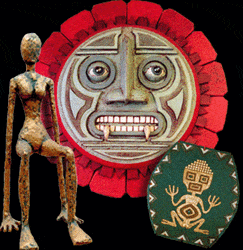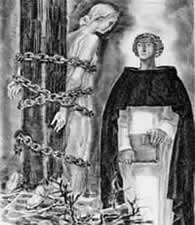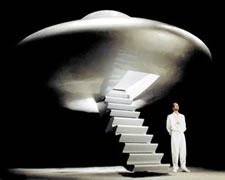A History and Understanding of Religion

Religious fervor never rises in a vacuum, but as a response to destabilizing forces that gnaw away at the fragile levels of human security. Religion originates, I believe, as a defense against fear. When traditional values begin to fade under the onslaught of a new discovery, an intellectual breakthrough or a rising consciousness, anxiety emerges masked as religious fervor.
Religion is born out of the very nature of what it means to be human, our gift of self-consciousness. The human psyche is suspended, as it were, between a constantly changing natural world out of which we have emerged, and the appeal of an unchanging reality that we have the ability to imagine and to which we believe we belong. Without this sense of being related to a transcendence, that we normally call God, human life faces the trauma of meaninglessness. We become no different from the animals going through the cycles of birth, maturation, mating, reproducing and dying. Animals tolerate that meaningless cycle because they are not self-conscious and do not live in the medium of time and thus do not know mortality. That is however, not a possibility for self-conscious human lives whose minds remember the past and plan for a future that includes their deaths. Self-consciousness is thus the source of the human drive to connect with something eternal, something not bound! by time and space. That is what makes us religious beings. Our images of God are, however, never static. When human life changes, our religious understandings must also change or they become either irrelevant or unbelievable. That is the moment when our god images die and the anxiety present in the human soul becomes palpable. A brief look at religious history makes this obvious.
 The earliest human religion was animism, in which we attributed an indwelling spirit to almost everything that moved, from the streams to the trees. Human beings sought, through primitive forms of worship, to accommodate themselves to these spirits, by placating the ones who might be angry and forming alliances with those deemed to be friendly. As human knowledge expanded, however, we learned that it was not an angry spirit that caused a disruptive high tide or the terror of gales and hurricanes, and thus our understanding of the divine had to be modified and refigured. Changes in our understanding of God usually reflect a change in human circumstances. When the human family transitioned out of the hunting and gathering mode into the more settled agricultural life, the God definition had to be adapted to the new reality. It was now not the animated spirit-filled world, but the fertility process and the cycles of nature that sustained human life. This forced our forebears to imagine God after the analogy of the Earth Mother, who caused crops to grow, animals to reproduce and women to give birth. Animistic images died and matriarchal religion was born. The earliest human religion was animism, in which we attributed an indwelling spirit to almost everything that moved, from the streams to the trees. Human beings sought, through primitive forms of worship, to accommodate themselves to these spirits, by placating the ones who might be angry and forming alliances with those deemed to be friendly. As human knowledge expanded, however, we learned that it was not an angry spirit that caused a disruptive high tide or the terror of gales and hurricanes, and thus our understanding of the divine had to be modified and refigured. Changes in our understanding of God usually reflect a change in human circumstances. When the human family transitioned out of the hunting and gathering mode into the more settled agricultural life, the God definition had to be adapted to the new reality. It was now not the animated spirit-filled world, but the fertility process and the cycles of nature that sustained human life. This forced our forebears to imagine God after the analogy of the Earth Mother, who caused crops to grow, animals to reproduce and women to give birth. Animistic images died and matriarchal religion was born.
 In time, however, this form of worship also ceased to explain all of life. Ancient people began to understand that a male was essential to the reproductive process, so a male consort for the earth goddess emerged. This male deity tended to be located in the sky, out of which came the wind and especially the rain, which was thought of as the Father God's divine semen sent to impregnate the Mother God so that the earth would reproduce. As male dominance grew the male deity emerged as the god of the clan or tribe protecting it like a great chief might. Tribal religion thus came to the fore. In time, however, this form of worship also ceased to explain all of life. Ancient people began to understand that a male was essential to the reproductive process, so a male consort for the earth goddess emerged. This male deity tended to be located in the sky, out of which came the wind and especially the rain, which was thought of as the Father God's divine semen sent to impregnate the Mother God so that the earth would reproduce. As male dominance grew the male deity emerged as the god of the clan or tribe protecting it like a great chief might. Tribal religion thus came to the fore.
Tribal gods, however, also proved to be quite mortal. When one tribe was defeated in battle, the vanquished people interpreted this as their god having been defeated, perhaps killed by a superior deity. History is thus, littered with the memories of tribal gods who failed and who could thus be worshipped no longer.
At every point in this human story, when the deity died or was displaced, the people experienced great anxiety, trauma and despair. The death of god always raises the fear specter of a bottomless pit of meaninglessness.
 Next the earth grew smaller and more interdependent, forcing the tribal deities to expand and to coalesce giving rise to the idea of a single deity. When the modern world dawned this one God had become all but universal, even though there were three major religious traditions, which still claimed the allegiance of great parts of the human population. The Judeo/Christian God provided the content for Western religion and spread into the Third World through colonial conquests. Islam provided the content of Middle Eastern religion as devotion to the God, Allah, began to unify a vast swath of the globe stretching from North Africa to Indonesia. The Hindu/Buddhist tradition provided the religious content for the people in the Far East, claiming the allegiance of the most populous nations on the earth. In time these three pathways began to interact and even to merge in the human consciousness. As this process occurred, yesterday's religious convictions were relativized until they provided less certainty, which in turn gave rise to greater and greater anxiety that found expression in all three traditions. Fanatical fundamentalism is the response to this anxiety and its omnipresence makes us aware that of vast changes taking place in our ever-shrinking world. Those who feel threatened by these changes turn dramatically toward yesterday's certainty. Those who welcome the new possibilities seek to move to a new consensus. That is where we are today. The more rooted in the past people are, the more they invoke an unchanging religious tradition' as their source of authority. Next the earth grew smaller and more interdependent, forcing the tribal deities to expand and to coalesce giving rise to the idea of a single deity. When the modern world dawned this one God had become all but universal, even though there were three major religious traditions, which still claimed the allegiance of great parts of the human population. The Judeo/Christian God provided the content for Western religion and spread into the Third World through colonial conquests. Islam provided the content of Middle Eastern religion as devotion to the God, Allah, began to unify a vast swath of the globe stretching from North Africa to Indonesia. The Hindu/Buddhist tradition provided the religious content for the people in the Far East, claiming the allegiance of the most populous nations on the earth. In time these three pathways began to interact and even to merge in the human consciousness. As this process occurred, yesterday's religious convictions were relativized until they provided less certainty, which in turn gave rise to greater and greater anxiety that found expression in all three traditions. Fanatical fundamentalism is the response to this anxiety and its omnipresence makes us aware that of vast changes taking place in our ever-shrinking world. Those who feel threatened by these changes turn dramatically toward yesterday's certainty. Those who welcome the new possibilities seek to move to a new consensus. That is where we are today. The more rooted in the past people are, the more they invoke an unchanging religious tradition' as their source of authority.
 No religious system tolerates change or relativity very well. The "True Faith" brooks no deviation. That is why religious people historically have burned heretics at the stake, excommunicated those thought schismatic and met attempted reformation with war. That is also why battles within religious systems are so bitter: Catholics and Protestants kill each other in Christianity, Shiite and Sunni in Islam, Orthodox and Reformed in Judaism. Fanaticism is found in all religious systems when truth is challenged and the old patterns begin to die. No religious system tolerates change or relativity very well. The "True Faith" brooks no deviation. That is why religious people historically have burned heretics at the stake, excommunicated those thought schismatic and met attempted reformation with war. That is also why battles within religious systems are so bitter: Catholics and Protestants kill each other in Christianity, Shiite and Sunni in Islam, Orthodox and Reformed in Judaism. Fanaticism is found in all religious systems when truth is challenged and the old patterns begin to die.
The most important single clue that we need to understand before we will be able to comprehend the rise of evangelical fervor in our country today is that religion is the primary psychological way human beings curb anxiety and battle meaninglessness. In a rapidly changing world of instant communication the former way we understood God is under attack, not from godless infidels, but from the relentless surge of the intellectual revolution of the last 500 years, stretching from Copernicus to Einstein, which eroded our confidence in our ancient God concepts. Frederick Nietzsche first discussed the death of God in the 19th century. He was dismissed as a madman. It was later talked about openly in the 1960's by a group of radical theologians like William Hamilton and Thomas J.J. Altizer. They were publicly ridiculed. Lonely voices like James A. Pike in the United States and John A.T. Robinson in the United Kingdom tried to embrace their insights, but their churches were not willing to listen. The people could conceive of God in no other way.
In our day the death of this traditional understanding of God has finally begun to permeate the general population. That is what is showing up now on our political map. The red states are those in which the majority responds to the demise of yesterday's understanding of God by denying that it is happening and seeking to preserve traditional values from more erosion. The emotional issues in the last campaign, abortion and homosexuality, do not play well in the world that seeks security in the unchanging patterns of yesterday. Other people, facing the same realities, see the old traditions as little more than outdated attempts to force the modern spirit back into yesterday's oppressive faith boxes. They rejoice in a new world of rising racial equality, emancipated women and the acceptance of gays and lesbians, all of whom have escaped  oppressive biblical stereotypes. A new image of God is struggling to be born. Some are frightened about it; others welcome it. That is the source of our present cultural divide. America is today divided by two diametrically opposite responses to the current spiritual crises, and it will not end until a new image of God emerges with unifying power. oppressive biblical stereotypes. A new image of God is struggling to be born. Some are frightened about it; others welcome it. That is the source of our present cultural divide. America is today divided by two diametrically opposite responses to the current spiritual crises, and it will not end until a new image of God emerges with unifying power.
- Bishop John Shelby Spong
Related: Spririts in the Sky
|

